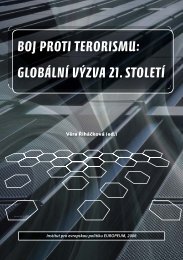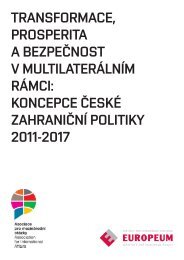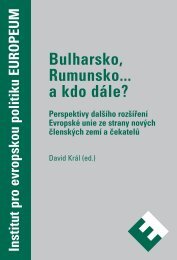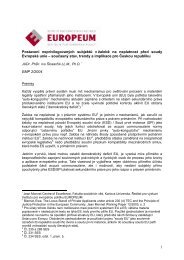eu constitutionalisation - EUROPEUM Institute for European Policy
eu constitutionalisation - EUROPEUM Institute for European Policy
eu constitutionalisation - EUROPEUM Institute for European Policy
Create successful ePaper yourself
Turn your PDF publications into a flip-book with our unique Google optimized e-Paper software.
Chapter 7: Flexible Integration in the Common Foreign and Security <strong>Policy</strong>Extending the scope of applicability of enhanced cooperation to all policyareas and thus the CFSP holds high potential to eventually unify loose cooperationsand deliberate coalitions under a more solid and institutionalisedumbrella within the framework of the <strong>European</strong> Union. This versatiletool will bundle synergies and optimise the external profile of the Unionnot only through the guarantee of assured recourse to the internationallyaccepted institutional framework. However, in the ideal case enhancedcooperation is not designed as a permanent instrument. On the contrary,measures of enhanced cooperation shall provide a legitimate transitionalframe <strong>for</strong> innovative and pro-integrationist initiatives, which after havingsuccessfully passed their proof of value may finally lead to full integrationinto the Union.The already established defence agency <strong>for</strong>ms part of the Union acquisfrom the beginning, although based on voluntary participation. Hence,this construction means a conversion of the classical concept of flexibilitywithin the EU. So far there have been various attempts to bring togetherthe existing variety of <strong>for</strong>mats of armament and defence programs pavingthe way <strong>for</strong> a specific institution. In this respect the exclusion of therelevant rules and obligations of the single market constitutes one of themost important challenges. The final success of the defence agency willconsiderably depend on the question whether participating member statesmay refrain from employing Article 296 TEC.Chapter 7: Flexible Integration in the Common Foreign and Security <strong>Policy</strong>It should be noted, that only the <strong>for</strong>m of closer cooperation as enacted inthe Draft Constitution contains elements of flexible integration whereas therevised clause incorporated into the final version has general effect. Solelythe obligations to take national particularities into consideration (above allthe status of n<strong>eu</strong>trality or non-alignment) and to respect the primacy of theNATO contain remnants of flexibility. All in all, this approaches point at theobjective of establishing collective defence within the EU legal framework,however without effectively realising it.The multi-faceted range of <strong>for</strong>ms of flexibility bears the potential to meetnew challenges without too much deviating from the path of Jean Monnet.The possible recourse to the mechanism of flexibility in the domain ofsecurity and defence does neither replace <strong>for</strong>mer instruments of flexibilitynor does it preclude flexible integration outside the Treaty framework.The effective interplay of the new variants of flexible integration, namelyenhanced, structured and armament cooperation could spark off an integrationistprocess which may allow the most progressive member states toproceed. The profits could be exploited by all if it succeeds to make these<strong>for</strong>ms effective on the basis of solidarity, whereby bridging the gap betweena policy of logjams and ambitions <strong>for</strong> directorates.The instrument of permanent structured cooperation pursues the objectiveto create the desired avant garde by setting up a catalogue containing predefinedcriteria which shall give participating member states an orientation<strong>for</strong> military trans<strong>for</strong>mation and allow them to assume leadership in thisfield under an EU umbrella. Given the highly institutionalised concept, theclear-cut procedures and the option to suspend participating States hint <strong>for</strong>a more durable institution. Permanent structured cooperation is by far themost integrated and predetermined <strong>for</strong>m of flexibility of all those discussedin this paper, and comes near to concepts such as Schengen or the EMU.One of the most striking innovations within the framework of the CFSPrefers to the (<strong>for</strong>mer) concept of closer cooperation in <strong>for</strong>m of a limitedcollective defence clause, which stipulates the obligation to give aid andassistance in case of an armed aggression against a member states however,without defining specific procedures, institutions or competences.274275








